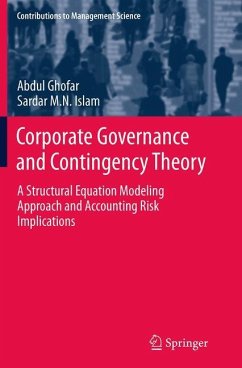
Financial Accounting and Management Control
The Tensions and Conflicts Between Uniformity and Uniqueness
Versandkostenfrei!
Versandfertig in 6-10 Tagen
38,99 €
inkl. MwSt.
Weitere Ausgaben:

PAYBACK Punkte
19 °P sammeln!
This book is about financial accounting and management control and how these two information systems are related as well as how their objectives conflict. At the most fundamental level, the objective of financial accounting is to provide owners and funders with comparable information on a company's value creation. The aim of management control, on the other hand, is to give the board, senior executives and employees unique information for strategy formulation and implementation. One often-mentioned negative effect is the risk of financial accounting affecting management control design and use,...
This book is about financial accounting and management control and how these two information systems are related as well as how their objectives conflict. At the most fundamental level, the objective of financial accounting is to provide owners and funders with comparable information on a company's value creation. The aim of management control, on the other hand, is to give the board, senior executives and employees unique information for strategy formulation and implementation. One often-mentioned negative effect is the risk of financial accounting affecting management control design and use, making it less relevant for decision-making at the company level. The book provides an analysis of the complex relationship between financial accounting and management control. The analysis is based on theoretical reasoning as well as several examples of how financial accounting standards affect not only the annual report but also the control system. An interesting, and perhaps unexpected conclusion is that management control seems to affect financial accounting almost as much as financial accounting affects management control. These complex relationships, which can influence the design and use of both financial accounting and management control, are discussed in detail in this book.













